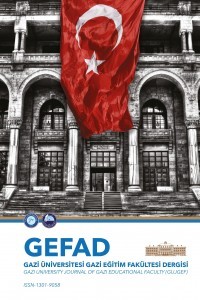EĞİTİMSEL SORGULAMA ÇERÇEVESİNDE GERÇEKLİĞİ ARAYIŞ: YABANCI ÖZÜMÜZÜ EHLİLEŞTİRMEK
Olgubilim (Fenomonolojik) açısından öz-algı ve kimlik (kişilik-karakter), yaşantılar ortaya çıkarken gelişir. Bu sürecin açıklığa kavuşturulması, sorgulama yöntemi olarak kullanılabilir. Bireysel ve toplumsal ilgilere yönelik yaşantıların anlatımı, duygu yüklü olan söylemsel ve kültürel içeriğin araştırılmasıyla paralellik gösterir. Bu makale, insanların diğer kültürle uzunca süre iletişim sürdürdüğünde oluşan, kimliğinin kültürlerarası ve sosyal yapısı üzerine kavramsal bir çerçeve sunar. Makale, kişinin geçici olarak kendine yabancılaşması sırasında, kültürlenme (kültürel yenilenme) sürecindeki kimlik değişikliklerini açıklar. Böyle bir kimlik sürecini anlatısal olarak ortaya çıkarmak, gerçeği söyleyişin, anlam arayışının eğitimsel yöntembilim olduğu bir sorgulamaya doğru katılımcıyı sürükler. Bu makaledeki yansımalar, eğitimsel ve öğretim programı sorgulaması çerçevesinde tartışılmıştır.
Anahtar Kelimeler:
Eğitimsel sorgulama, öğretim programı, dilbilim ve kültürlerarası
TRUTH TELLING AS EDUCATIONAL INQUIRY: TAMING THE FOREIGN SELF
Phenomenologically, self-perception and identity develop as experience unfolds. Clarifying this process can be used as a method of inquiry. Narratives of experience on both humane and social concerns mesh with the exploration of discursive and cultural contents that are filled with emotional contents. The article offers a theoretical overview on the intercultural and social construction of identity that occurs when people have prolonged contacts with another culture. It shows in what way the processes of acculturation entail identity changes in the course of which one becomes, momentarily, foreign to oneself. Unfolding narratively such identity processes places the participant into an inquiry in which truth telling becomes an educational methodology in the quest for meaning. The reflections in this article are discussed around the frame of educational and curriculum inquiry.
Keywords:
Educational inquiry curriculum, linguistic, interculture,
___
- Alighieri, D. (1314/1950). The divine comedy: Hell. London: Penguin Classics. Retrieved March 1st, 2009 from http://www.divinecomedy.org/divine_comedy.html
- Apple, M.W. (2004). Neoliberalizm ve eğitim politikaları üzerine eleştirel yazılar. İstanbul: Eğitim Sen Yayınları.
- Apple, M.W. (1990). Ideology and curriculum. New York: Roudledge.
- Barnes, M., & Berke, J. (1973). Mary barnes: Two accounts of a journey through madness. New York Ballantine Books.
- Bourdieu, P. (2004). Esquisse pour une auto-analyse. Paris: Raisons d’Agir, Cours et Travaux.
- Bové, J. (2002). The world is not for sale: Farmers against junk food. New York: Verso.
- Bozkurt G. (1972). İnsan ve kültür. İstanbul: Remzi Yayınevi.
- Fer, S. ve Cırık İ. (2007). Yapılandırmacı öğrenme: Kuramdan uygulamaya. İstanbul: Morpa Yayınları.
- Freud, S. (1923). The Ego and the ID. New York: Norton. http://www.loc.gov/exhibits/freud/ex/73a.html
- Freud. S. (1938). An outline of psycho-analysis. New York: Norton.
- Fromm, E. (2004). Yanılsama zinciri. İzmir: İlya Yayınevi.
- Giroux, A.H., Penna, A.N., & Pinar, W.F. (1981). Curriculum and instruction. California: McCutcheon.
- Hacking, I. (2006). Making up people. London Review of Books, 28(16). Retrived January 15, 2009 from http://www.generation-online.org/c/fcbiopolitics2.htm Jung, C. G. (1973a). Collected works of C. G. Jung. Princeton, NJ: Princeton University Press.
- Jung, C. G. (1973b). Dialectique du moi et de l’inconscient (Dialectic of the Ego and the Unconscious). Paris: Gallimard.
- Kuban, D. (2009). Militarizm ve milliyetçilik. Cumhuriyet Bilim Teknoloji, 1142, 5.
- Laing, R. D. (1960). The divided self. London: Tavistock.
- Laing, R. D. (1967). The politics of experience. NewYork: Pantheon.
- Laing, R. D. (1969). The politics of the family. London and Toronto: Tavistock/CBC. McNeil J.D. (1996). Curriculum: A comprehensive introduction. New York: Harper Collins College.
- ISSN: 1301-9058
- Yayın Aralığı: Yılda 3 Sayı
- Başlangıç: 1985
- Yayıncı: Gazi Üniversitesi
